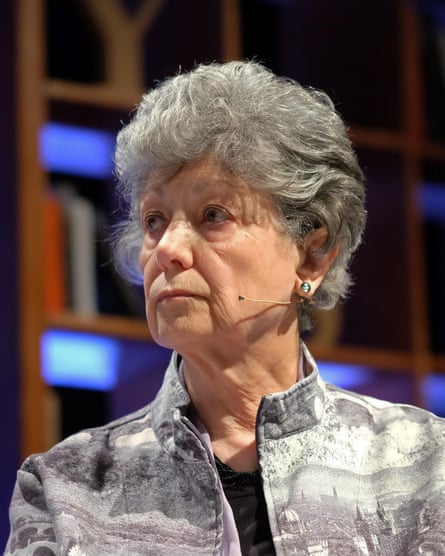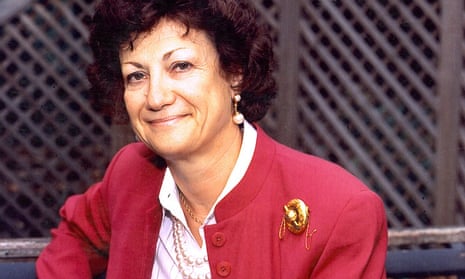The invasion of information technology into healthcare brought the ancient principle of confidentiality between doctor and patient into conflict with opportunities to store and share data collectively.
Fiona Caldicott, who has died aged 80, devoted the last 25 years of her life to resolving this issue within the UK National Health Service. She chaired three government reviews of information governance and in 2014 became the first National Data Guardian, appointed to “advise and challenge the health and care system to help ensure that citizens’ confidential information is safeguarded securely and used properly”.
Caldicott was a private person, rarely in the public eye: as one writer put it, “she knew outcomes were more important than headlines”. Trained as a psychiatrist and psychotherapist, she would ask searching questions, listen intently to the answers, and respond with thoughtfulness and insight. In 1996, having completed her term as the first female president of the Royal College of Psychiatrists, she agreed to chair a committee investigating how the NHS managed patient-identifiable data.
Her report spelled out what became known as the Caldicott principles of information governance. The original six principles included justifying the purpose of any use or transfer; not using data unless absolutely necessary; and making sure anyone accessing data is aware of their responsibilities. Following further reviews in 2013 and 2016, Caldicott added two more principles. These made it clear that the duty to protect patients’ confidentiality should be balanced by the duty to share information when there is a clear benefit in doing so, and that patients should be informed as to how their confidential data might be used.
She also recommended that every NHS trust and social services provider should appoint someone to monitor how patient data is stored and used. There are now more than 22,000 Caldicott Guardians in the UK (a name that she certainly never suggested herself).

Caldicott’s commitment to public service was lifelong. She began her work on information governance after she had formally retired from a full career as a consultant in mental health. In 1990 she was elected the first female dean (chief academic officer) of the Royal College of Psychiatrists, and at the end of her three-year term became the first woman to be president.
As chair of the Academy of Royal Medical Colleges (1995-96) she realised that she was the only one of her fellow presidents to have trained part time. The RCPsych developed new, flexible training pathways, and, following national legislation, all doctors in training now have the right to apply for less than full-time positions so that they can balance careers with family life.
In 1996 Caldicott accepted election as principal of Somerville College, Oxford, a former women’s college that had voted to become co-educational only two years previously. Much of her psychiatric practice had been with young adults, and she relished the prospect of caring for a community of students.
Between her arrival and her retirement in 2010 she shepherded the college into the 21st century with astute fundraising and building decisions, while her handling of personal issues was discreet and compassionate. She (and her beloved cat Pogo) won the admiration of the students, and she was proud to join “Dame Fi’s Barmy Army” on the touchline to watch the college’s first women’s soccer team in the final of the intercollegiate cup.
As the university’s pro-vice-chancellor for personnel and equal opportunities (2001-10), she proved a trusted mentor to academic women. She chaired the Oxford University Hospitals NHS foundation trust (2009-19). At one time or another she was a board member or trustee of a huge range of public bodies, including the Medical Workforce Standing Advisory Committee, the Broadcasting Standards Commission and the Nuffield Trust. She was made a dame in 1996.
Born in Troon, Ayrshire, Fiona was the daughter of Joseph Soesan and his wife, Elizabeth (nee Ransley). Joseph’s parents were greengrocers in the East End of London and “didn’t believe in education”.
Joseph himself left school in his teens, but studied chemistry at night school and had begun a correspondence course in law when he was posted as a chemist to a munitions factory on the Ayrshire coast during the early years of the second world war. Elizabeth was a civil servant, but had to give up her career on marriage. In 1944 the family returned to London and settled in Ilford, Essex (now in the London borough of Redbridge); Joseph qualified as a barrister and later worked for Shell.

Fiona and her younger sister, Judith, grew up in a household dedicated to learning and public service, and she went on a scholarship to City of London school for girls. In 1960 she won a place at the then all-female St Hilda’s College, Oxford, to study medicine.
In 1965 she married Robert Caldicott, who ran a family wine business in Coventry. Fiona completed her medical training in the Midlands, initially working in general practice and family planning. After her daughter, Lucy, and son, Richard, were born, she took the opportunity, not then available in all specialisms, to do her psychiatric training part time. She became a consultant psychiatrist and psychotherapist in 1979, and held a number of clinical, supervisory and teaching posts in Coventry and Birmingham until 1996.
Caldicott’s serious demeanour and strikingly elegant appearance made a formidable impression. But close acquaintances emphasised her kindness, integrity and deep interest in others. Her packed schedule left little time for leisure, but she enjoyed travel with her husband on his wine-buying trips to Europe. In 2016 she was a member of the all-women St Hilda’s team (also including the crime writer Val McDermid) that vanquished all comers in Christmas University Challenge.
She had breast cancer in 2014, and last year was diagnosed with pancreatic cancer. Although in very poor health, she continued her work as National Data Guardian until shortly before her death, cared for by Lucy and Robert, who survive her, as does Judith. Richard died following a motor vehicle accident in 1990.

Comments (…)
Sign in or create your Guardian account to join the discussion